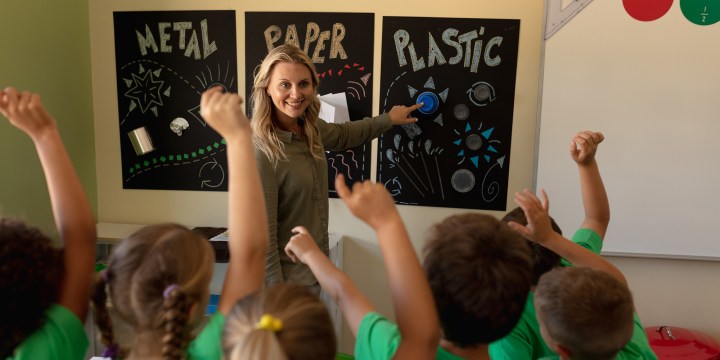ENVIRONMENTAL LITERACY
Department concedes SA schools must modify curriculums to deliver climate change education

There is a need to adjust and modify the curriculum to effectively teach climate change in schools, says the Department of Basic Education.
The Department of Basic Education concedes that the curriculum for climate change issues in schools needs to be adjusted and modified. This was confirmed by Likho Bottoman, Deputy Director: Social Mobilisation and Support Services. He was speaking at the Government Communication and Information System and Agape Youth Movement webinar on the involvement of children in climate change action.
Bottoman said that teachers responsible for delivering climate change content in Life Orientation are sometimes not adequately prepared.
The webinar’s aim was to showcase programmes that activate children’s involvement in climate change action, encourage behavioural change for communities to participate in the mitigation of effects of climate change and disaster risk reduction, and public education on measures to reduce the impact of climate change and preserve the environment.
“There has been criticism around teacher development. They don’t have the potential to deliver content on climate change. We have now developed Life Orientation textbooks that have a whole section dedicated to climate change and we hope this textbook will be finalised by 2023.”
He said they have provided specific lesson plans for educators so that no matter who they are as an end user, and wherever they are in the country, they have something to use as a script if they run out of ways of delivering climate change information and content to children according to the grades.
“We are working with our partners in civil society, business, government entities … we are putting our heads together, because we realised that if we miss the opportunity of imparting climate change knowledge at a school level – while children are a captive audience – we might just be adding to the problem of climate change,” Bottoman said.
He said many thought climate change was a European concept and not a problem for Africans.
Visit Daily Maverick’s home page for more news, analysis and investigations
Bottoman said with the right resources, skills, expertise, materials and tools, we can ensure a response to the climate change problem.
“I think that we are behind where we are supposed to be as far as response mechanisms for climate change and consent are concerned. We need to catch up.”
He said there needs to be more efficiency and cooperation.
“We cannot do this alone; we require all stakeholders to share the resources that exist outside the Department of Basic Education to support us in our new vision of climate change,” he said.
Cindy-Lee Cloete, Wildlife and Environment Society of South Africa (Wessa) head of projects, said: “Climate education in South Africa has a lot of structures in place. The Department of Basic Education and its partners have done a tremendous amount of work in laying the foundation to enable climate education in South Africa.”
She said Wessa does a lot of work with teachers, learners and school leadership teams to be able to create an enabling environment to include climate education in children’s everyday lives.
“…. areas of improvement identified include the need to change the approach to education. If we are going to completely immerse ourselves in campaigning and fighting for our communities against the impacts of climate change, we have to take a different approach…
“We have to look at how we bring children’s voices and the youth into spaces that do not link to tokenism, and engage them in a meaningful way so their voices are heard.”
She said everybody keeps saying future generations will be most impacted by climate change, but nobody has invited them to the table to ask them how to make their future more sustainable.
According to Cloete, some scientists are saying we have gone past the 2°C point in some places in South Africa.
“The hotter places, or the hotter provinces – for example, the Northern Cape – it’s predicted that temperatures will rise 7°C by 2050. So the two degrees that they are speaking about is history, and has a completely different meaning for South Africa and Africa,” she said.
“A global survey revealed that only 53% of countries have climate change education in their national schools curriculum, and 70% of learners can’t explain climate change.
“Part of the problem is that, globally, schools education is done through a passive transfer of knowledge. Education needs to adopt active methods that generate advocacy and agency … that’s really how voice is amplified,” said Cloete. DM/OBP






















 Become an Insider
Become an Insider
Comments - Please login in order to comment.